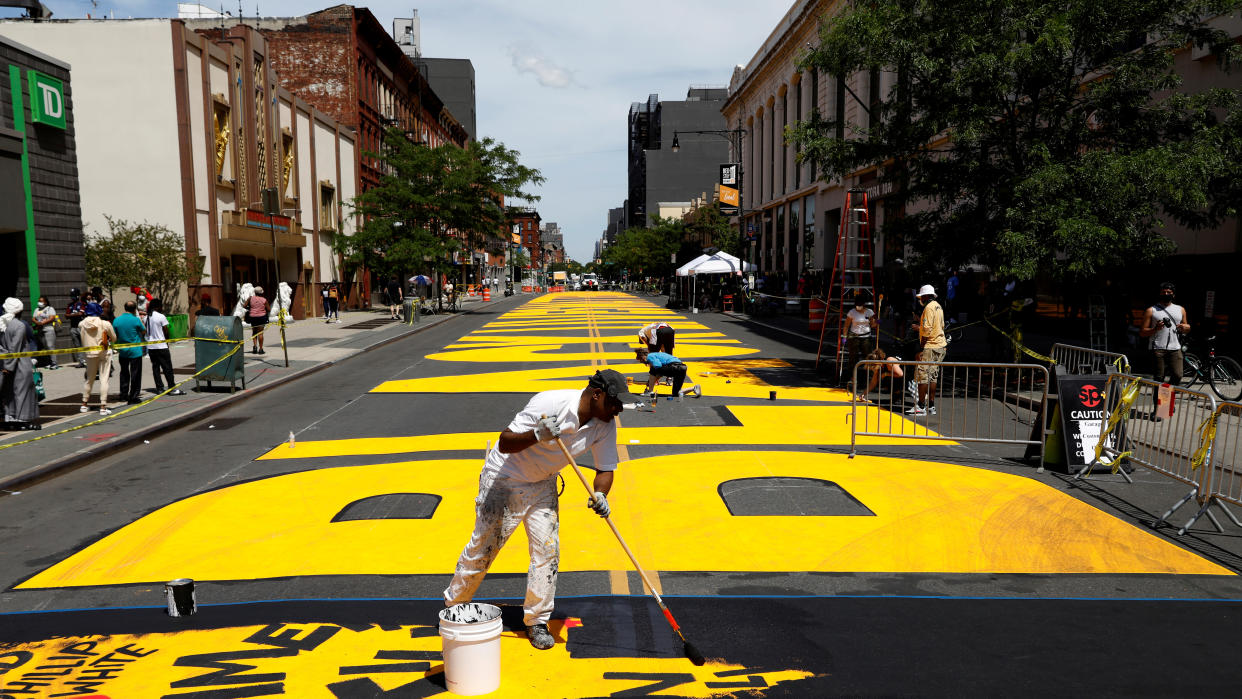Activists say Black Lives Matter street murals are 'performative support': 'They don’t stop the next murder of a Mr. Floyd'

Artists from cities big and small across the United States have taken gallons of paint to the streets to spell out the rallying cry of the Black Lives Matter movement. Though many celebrated the significance of the murals that have popped up around the country and the attention they bring to the cause, some activists have criticized officials for not backing the artwork up with real policy changes, begging the question: Are the murals enough?
Following the death of George Floyd in May, there have been increasing calls to defund the police and for officials to hold officers accountable when they use excessive force. With protests happening daily across the country, Color of Change Vice President Arisha Hatch tells Yahoo Life that a shift has begun.
“A lot of people are being woken up to the type of violence Black people face on a daily basis,” Hatch says. “A lot of people have been woken up to the type of reforms that activists have been asking for for decades.”
Though she believes that the gesture of the street murals may be coming from a positive place, they also miss the mark.
“I do think that the outpouring of at least performative support, is in someways based in the fact that folks are recognizing that the status quo is no longer livable, but they are doing this in ways that are allowing them to ignore their own power to make change in the lives of Black people,” she says.
Dorothy A. Brown, a professor at Emory University School of Law and social justice advocate, tells Yahoo Life that while she enjoyed the fact that a Black Lives Matter mural was painted in front of Trump Tower in New York City, she says that painting murals aren’t anti-racist, but a way to please the media.
“The media likes pictures, it’s an image, it can go viral, it’s something you can see,” she says. “So it’s something that’s been picked up in the press because it’s pretty, right? And it’s visually stimulating and people say words around these events, but where is the media to follow up with what happens once the paint dries?”
The murals caught on like wildfire after Washington, D.C., Mayor Muriel Bowser debuted a Black Lives Matter mural just blocks away from the White House in June. She even dubbed the area Black Lives Matter Plaza and was praised by some for the perceived zing against President Trump. But her praise was short-lived after she told NPR that she did not have plans to cut the D.C. Metropolitan Police Department’s budget, but instead increase it.
The Washington, D.C., chapter of Black Lives Matter called the mural a move “to appease white liberals while ignoring our demands.”
This is a performative distraction from real policy changes. Bowser has consistently been on the wrong side of BLMDC history. This is to appease white liberals while ignoring our demands. Black Lives Matter means defund the police. @emilymbadger say it with us https://t.co/w0ekwSG1ip
— BlackLivesMatter DC (@DMVBlackLives) June 5, 2020
Other officials in U.S. cities have faced similar criticisms.
“[Murals] don’t change anything,” Brown says. “They don’t stop the next murder of a Mr. Floyd. They don’t improve K-12 in these neighborhoods. They don’t raise minimum wage. They don’t increase job opportunities. They don’t do anything that would root out the systemic racism that’s holding Black Americans behind.”
Hatch calls this moment unique, attributing that to the pandemic and escalation of recent killings of Ahmaud Arbery, Breonna Taylor and George Floyd, along with the various “Karen” videos that have come out in recent months as fuel to galvanize public support.
“I don’t think we should undercount that or diminish that in any way because some of these things are positive from a culture change perspective in terms of building momentum, but the real work is actually getting corporations, politicians and other powerful decision-makers to actually follow through in change practices,” she says.
For those wondering what they can do to help, Hatch says it’s important to continue to keep the conversations around systemic injustice alive to make sure the thoughts and ideas of the Black Lives Matter movement are not radicalized because “they are not radical.”
“I want people to remain hopeful and know that as a movement, we’re winning,” she says. “Although we haven’t achieved all the results we want to see happen, I think over the course of the last five years, our demands as a movement have become a lot more specific and clear.”
Read more from Yahoo Life:
Want daily wellness, lifestyle and parenting news delivered to your inbox? Sign up here for Yahoo Life’s newsletter.
